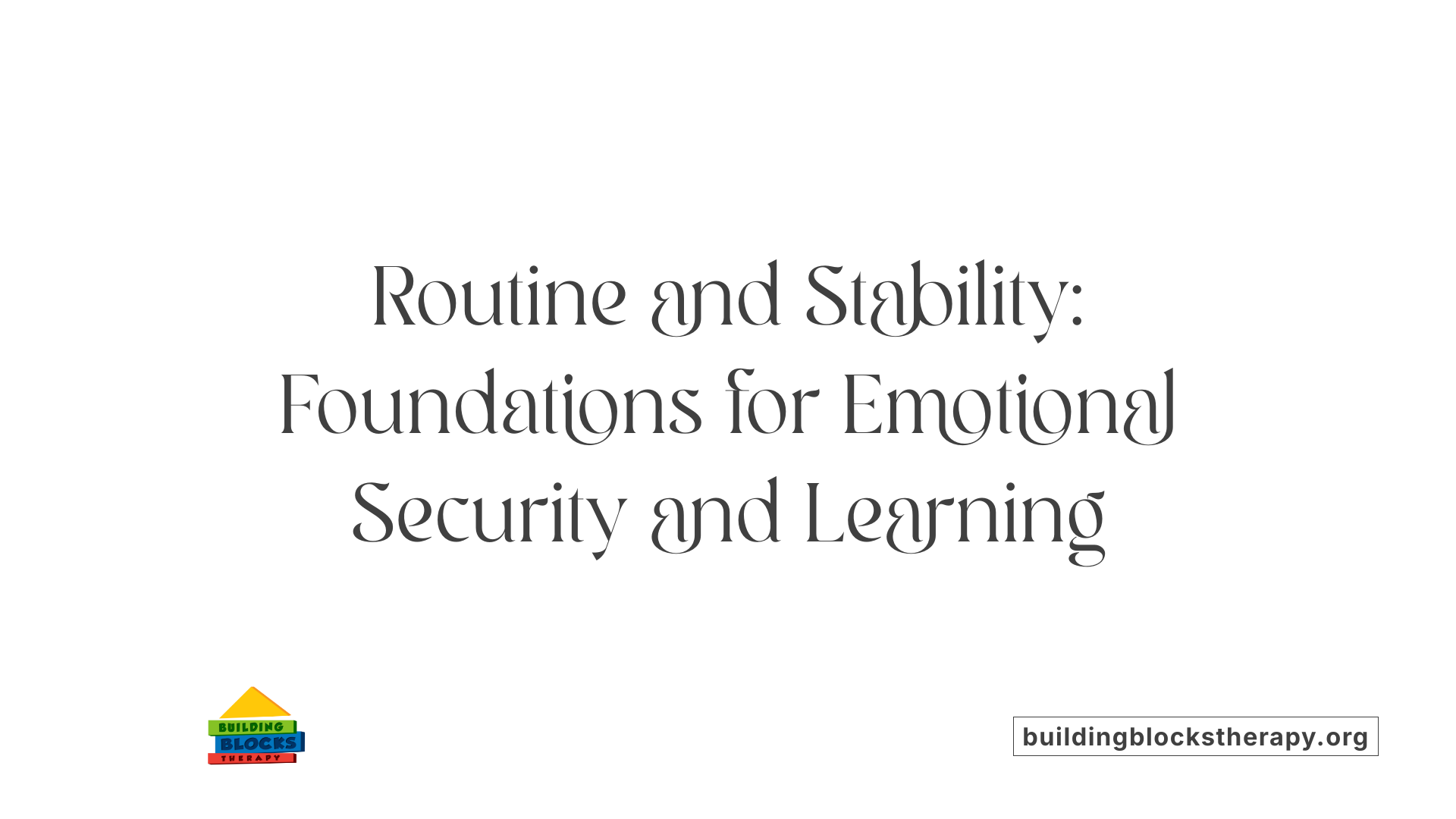Understanding the Critical Role of Consistency in Children's Therapeutic Journeys
For children with special needs, such as autism or developmental delays, consistent therapy is not just beneficial—it's essential. This article explores the profound impact of maintaining regular, structured, and predictable therapeutic routines, emphasizing how consistency fosters skill development, enhances behavior management, and builds strong therapeutic relationships. By delving into evidence-based insights and practical strategies, we demonstrate why a steady approach can significantly improve long-term outcomes for these children.
The Foundation of Consistency in ABA Therapy
What is the role of consistency in ABA therapy for children with autism?
Consistency is a fundamental element in Applied Behavior Analysis (ABA) therapy, playing a vital role in how effectively children with autism learn and adapt. It involves applying specific techniques and creating environments that are predictable and structured.
When routines and approaches are consistent, children experience a sense of security and stability. This reduces feelings of anxiety and helps them feel safe as they navigate new skills and behaviors.
By applying behavioral principles like prompts and reinforcements uniformly across sessions, therapy becomes more effective. Children begin to recognize patterns, which enhances their understanding and helps with the generalization of skills to different contexts.
Maintaining consistent therapy also supports accurate and detailed progress tracking. Regular assessments and data collection allow therapists to tailor strategies and celebrate milestones, boosting motivation.
Furthermore, consistency benefits the relationship between the child and therapist. Building trust through predictable interactions encourages engagement and facilitates more meaningful participation.
Overall, this steady and reliable approach significantly improves outcomes in communication, social skills, and independence, ensuring that children gain the most from their therapy experience.
How Routine Builds Emotional Security and Learning in Children

What is the impact of regular and ongoing therapeutic interventions on a child's development?
Regular and ongoing therapeutic interventions are vital for supporting a child's overall growth. When therapy is consistent and personalized, it provides a steady foundation for children to develop vital skills such as communication, motor abilities, and emotional regulation. These interventions often include approaches like speech, occupational, and play therapy, which are especially beneficial for children with developmental challenges.
Consistency in therapy helps to build trust between the child and therapist. This trust encourages the child to engage more fully, leading to better learning and emotional development. Moreover, regular sessions foster strong parent–child and therapist-child relationships, which are crucial for success.
Through ongoing support, children can experience fewer delays and develop resilience. Many children show improvement in social skills, problem-solving, and independence when therapy is continuous. These positive impacts extend beyond the therapy setting, helping children to apply new skills in everyday life.
Overall, sustained therapy not only boosts cognitive and language skills but also contributes to emotional health and social competence. When combined with nurturing caregiving practices, consistent intervention significantly enhances a child's long-term developmental outcomes.
Reduces Anxiety and Improves Emotional Stability
Maintaining structured routines in therapy can help children feel secure. When they know what to expect, their anxiety decreases, and they become more emotionally stable. This consistency provides a safe environment where children can focus on learning without feeling overwhelmed.
Establishes Predictable Routines that Foster Engagement
Predictable schedules and clear routines make it easier for children to participate actively in therapy. Visual schedules and routine-based activities create a sense of order, which motivates children and encourages persistent engagement. Such routines also help children become familiar with new tasks, reducing resistance and promoting a positive attitude towards learning.
In conclusion, consistent routines and continued therapeutic engagement are foundational for fostering emotional stability and promoting meaningful learning in children with autism or developmental delays.
The Role of Consistent Relationships in Effective Therapy

Why is consistency important in therapy for children with special needs?
Consistency plays a crucial role in therapy for children with special needs, particularly for those with autism spectrum disorder. It helps reinforce learning by providing a predictable structure that children can understand and anticipate. This predictability reduces confusion and anxiety, creating an environment where children feel safe and secure.
When routines and approaches remain stable, children tend to focus better and develop emotional stability. Repeating instructions and applying behavioral principles like prompts and reinforcements consistently enhances the likelihood of skill retention and generalization. Skills learned during therapy can then be more easily transferred to everyday situations at home, school, and community settings.
Moreover, maintaining regular and predictable therapy sessions allows therapists and caregivers to track progress more accurately. This ongoing assessment ensures interventions are effective, and adjustments can be made promptly.
Overall, consistency helps maximize developmental gains, promotes independence, and fosters long-term success for children with special needs.
Strategies to Ensure Stability and Progress

Use of standardized protocols
Implementing standardized protocols in ABA therapy ensures that treatment methods are consistent, reproducible, and based on evidence-based principles. This means that every session follows a clear, structured plan that minimizes variability and helps children learn in a predictable environment. Standardized procedures aid therapists in accurately tracking progress, analyzing data, and adjusting strategies effectively. They also help new team members integrate seamlessly into the therapy process, maintaining continuity.
Stable therapy teams and continuity across sessions
Having a stable team of therapists or consistent one-on-one therapy helps children develop trust and a sense of security. Regular interactions with familiar therapists allow for better understanding of the child's individual needs, preferences, and progress. Continuity across sessions ensures that behavioral principles and routines are applied uniformly, boosting learning outcomes and reducing the likelihood of confusion or resistance.
Family involvement at home
Supporting consistency outside the therapy setting is crucial. Families can establish routines using visual schedules and predictable responses, which reinforce what children learn during sessions. When parents and caregivers are actively involved, they can help transfer skills into everyday life, shaping behavior in real-world contexts. This ongoing support fosters emotional growth, helps generalize skills across environments, and contributes to overall development.
| Strategy | Benefits | Implementation Tips |
|---|---|---|
| Use of standardized protocols | Ensures consistency and evidence-based practice | Use therapy manuals, checklists, and ongoing staff training |
| Stable therapy teams and continuity | Builds trust and tailored interventions | Minimize staff changes, promote team communication, plan transitions |
| Family involvement at home | Reinforces learning and generalization | Share routines, train caregivers, use visual supports |
Overall, these strategies create a reliable framework that supports children with autism or developmental challenges by providing an environment conducive to steady progress and skill mastery.
Supporting Learning and Development at Home and Beyond

How does consistent therapy benefit skill development and behavior management in children with special needs?
Consistency plays a crucial role in the success of therapy, especially in applied behavior analysis (ABA). When therapy routines are structured and predictable, children are better able to understand what to expect, which reduces anxiety and confusion. This safe and stable environment encourages learning and emotional growth.
Through regular and standardized sessions, children can develop and reinforce new skills effectively. Repetitive practice and clear cues help with skill retention and facilitate generalization across different settings, such as home, school, and community environments.
Maintaining consistent application of behavioral principles, like prompts and reinforcements, leads to better behavioral management. It allows therapists and parents to accurately monitor progress, identify triggers for challenging behaviors, and develop tailored strategies to address them.
A steady routine also helps build trust between the child and therapist or caregiver, which increases engagement and motivation. This reliable relationship is key for effective intervention and fosters a sense of security for the child.
Furthermore, consistency supports emotional regulation by establishing familiar routines, which are especially comforting for children with autism and other developmental challenges. Ultimately, a stable approach creates a strong foundation for continuous growth, successful adaptation to new environments, and improved overall functioning.
| Benefits of Consistent Therapy | How It Supports Development | Additional Details |
|---|---|---|
| Skill acquisition and retention | Repetition helps learn and apply new skills | Use of standardized routines minimizes confusion |
| Behavior management | Clear expectations reduce unwanted behaviors | Consistent reinforcement improves behavior |
| Emotional stability | Predictable routines foster comfort | Builds trust in caregivers and therapists |
| Generalization of skills | Practice across settings promotes adaptability | Regular assessments guide progress |
| Strong therapeutic relationships | Trust leads to better engagement | Consistency in therapist matches and sessions |
Consistency in therapy extends beyond clinical sessions. Supporting routines at home, involving parents actively, and creating a uniform environment help solidify progress. When parents are trained and empowered to implement similar routines using visual schedules and predictable responses, children experience reinforces their learning and emotional security into their daily lives.
Conclusion: A Long-Term Investment in a Child's Future
 Consistency in ABA therapy is fundamental to supporting children with autism effectively. When routines, approaches, and relationships are stable, children experience reduced anxiety, enhanced feelings of safety, and better engagement in learning activities. The regular application of behavioral techniques—such as prompts, reinforcements, and behavioral momentum—ensures skills are learned, practiced, and generalized across different environments, promoting independent functioning.
Consistency in ABA therapy is fundamental to supporting children with autism effectively. When routines, approaches, and relationships are stable, children experience reduced anxiety, enhanced feelings of safety, and better engagement in learning activities. The regular application of behavioral techniques—such as prompts, reinforcements, and behavioral momentum—ensures skills are learned, practiced, and generalized across different environments, promoting independent functioning.
Structured scheduling, stable therapy teams, and ongoing professional development at centers like Asteri help maintain this consistency, leading to improved behavioral management and faster skill acquisition. Involving families in consistent routines, visual schedules, and uniform responses at home further reinforces these gains, fostering emotional stability and reducing resistance.
A crucial aspect of successful ABA therapy is building strong, trusting relationships between children and therapists. Such bonds not only enhance motivation and engagement but also allow for meticulous progress tracking through regular assessments and data collection. This enables tailored strategies that adapt to each child's evolving needs, ultimately supporting long-term development.
Although challenges like therapist turnover exist, proactive strategies such as transition plans and backup systems help minimize disruptions. The overall emphasis remains clear: consistency provides a stable foundation that helps children with autism reach their full potential, offering positive, lasting outcomes for their future.
Fostering Long-Term Success Through Consistency
In conclusion, consistent therapy practices are fundamental in unlocking the full potential of children with special needs. They provide a stable and secure environment where skills can be learned, behaviors can be managed effectively, and relationships can flourish. When therapy routines are maintained diligently, supported by trained professionals and active caregiver involvement, children experience greater engagement, better generalization of skills, and improved developmental outcomes. The commitment to consistency is a long-term investment that yields substantial benefits, fostering resilience, independence, and happiness for children on their developmental journeys.
References
- The Importance of Consistency in Autism Therapy
- The 6 Benefits of Consistent ABA Therapy
- Direct ABA Therapy: Why Consistency Is Key to Better ...
- The Importance of Sticking to Consistent ABA Therapy
- Play therapy in children with autism: Its role, implications ...
- The Importance of Consistency in Autism Therapy
- The Importance of Sticking to Consistent ABA Therapy
- The 6 Benefits of Consistent ABA Therapy
- 8 Reasons to Prioritize ABA Therapy: Consistency is Key






